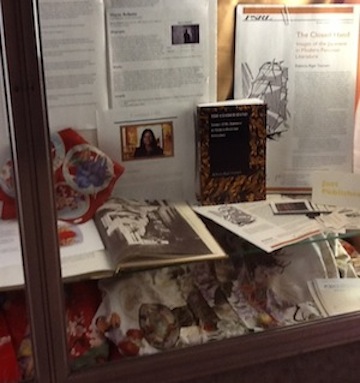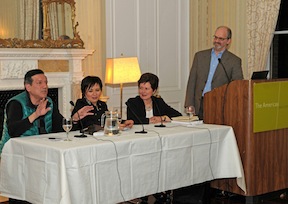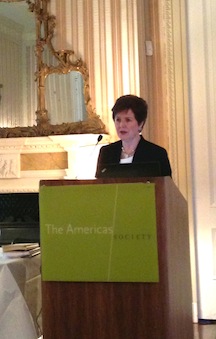The Closed Hand: Images of the Japanese in Modern Peruvian Literature
Rebecca Riger Tsurumi
In her book, The Closed Hand: Images of the Japanese in Modern Peruvian Literature, Rebecca Riger Tsurumi captures the remarkable story behind the changing human landscape in Peru at the end of the nineteenth century when Japanese immigrants established what would become the second largest Japanese community in South America. She analyzes how non-Japanese Peruvian narrators unlock the unspoken attitudes and beliefs about the Japanese held by mainstream Peruvian society as reflected in works written between l966 and 2006. Tsurumi explores how these Peruvian literary giants, including Mario Vargas Llosa, Miguel Gutiérrez, Alfredo Bryce Echenique, Carmen Ollé, Pilar Dughi, and Mario Bellatin, invented Japanese characters whose cultural differences fascinated and confounded their creators. She compares the outsider views of these Peruvian narrators with the insider perceptions of two Japanese-Peruvian poets, José Watanabe and Doris Moromisato, who tap personal experiences and memories to create images that define their identities.
The book begins with a brief socio-historical overview of Japan and Peru, describing the conditions in both nations that resulted in Japanese emigration to Peru and concluding in contemporary times. Tsurumi traces the evolution of the terms “Orient” and “Japanese/Oriental and the depiction of Asians in Modernista poetry and in later works by Octavio Paz and Jorge Luis Borges. She analyzes the images of the Japanese portrayed in individual works of modern Peruvian narrative, comparing them with those created in Japanese-Peruvian poetry. The book concludes with an appendix containing excerpts from Tsurumi’s interviews and correspondence in Spanish with writers and poets in Lima and Mexico City.
"The Closed Hand is a very important study that helps us understand not only the portrayal of the Japanese in Peruvian literature, but the life, challenges, and struggles of a Far Eastern group in the Southern Hemisphere." —Araceli Tinajero, author of Orientalismo en el modernismo hispanoamericano
“Tsurumi’s book is an apt contribution to understanding the place of Japanese culture in contemporary Peru. In addition to her focus on Japanese race and cultural assimilation, she also applauds the need to reconsider the wealth and diversity of Nisei culture in Peruvian literature.” —César Ferreira, Hispania 97.1 (Mar. 2014): 162-63
"...[the author] has included, in one collection, many fictional images of the Japanese in Peru. ... a valuable addition to the study of Asians in the Americas." —Debbie Lee-Distefano, Transmodernity 2.1 (2012): 72-74.
“…. Tsurumi se encarga de mostrarnos cómo una constante negativa en el imaginario peruano… revitaliza una tensión que a nivel del discurso fijará a los protagonista a patrones casi siempre contradictorios o invariables.… revelando así, no sólo réplicas de ciertos modelos o estereotipos estéticos, sino también prejuicios o creencias que un grupo dominante formuló silenciosamente con respecto a una minoría racial.” —Carlos Yushimito del Valle, Inti No. 75-76 (2013): 405-07
“…el libro de Rebecca Riger Tsurumi supone un valioso aporte crítico que sistematiza e incorpora dentro de la historia de la literatura peruana las distintas perspectivas sobre los dilemas que atravesaron los japoneses en la nueva tierra donde decidieron establecerse.” —Chrystian Zegarra, Revista de Estudios Hispánicos 47.3 (Oct. 2013): 603-05.
“This book mainly focuses on how the Japanese have been represented by Peruvian writers in novels written between 1966 and 2006. … [it] develops the topic well…”Christian Fernández, Review: Literature and Arts of the Americas, Issue 87, 46.2 (2013): 302-03.
"Overall, this book is a very soid contribution to the analysis of Japanese immigration to Peru and the impact of Japanese culture in contemporary Peruvian letters. It shows that Peruvian society is much more diverse and complex than one might expect." —Miguel Ángel González-Abellás, Studies in 20th and 21st Century Literature 39.1 (2015): article 14, http://dx.doi.org/10.4148/2334-4415.1821
For more reviews of Tsurumi's work, see
- Reference and Research Book News, June 2012.
- Debra Banerjee, "Author Takes Literary View of Japanese in Peru." Scarsdale (NY) Inquirer, 10 Aug. 2012, p. 3.
Rebecca Riger Tsurumi has worked as a journalist/editor in Latin America and the United States. A Latinamericanist who focuses on relations between Asia and Latin America, she received a PhD in Hispanic and Luso-Brazilian Literatures and Languages from the CUNY Graduate Center and has taught Spanish language and literature courses at various colleges within the City University of New York, SUNY Purchase College, and Adelphi University. She resides with her family in New York.
PSRL 54. 2012. xvi, 314 pp. Paper ISBN 978-1-55753-607-5 $45.00; ePDF 978-1-61249-213-1 $22.99; ePUB 978-1-61249-212-4 $22.99.


Display case in Stanley Coulter Hall, April 11 to April 18, 2012.
Book Launch at the Americas Society, March 21, 2013
Author Rebecca Tsurumi addresses the audience at
the Book Launch for her The Closed Hand,
held at the Americas Society on March 21, 2013.
A book launch for The Closed Hand: Images of the Japanese in Modern Peruvian Literature, by Rebecca Riger Tsurumi, was held on Thursday, March 21, 2013, at the Americas Society, 680 Park Avenue, New York, New York. Professor Tsurumi made a book presentation after which a panel of experts commented on the book and related topics. The moderator was Dan Shapiro, director of the Literature Department of the Americas Society. Speaking were Professors Araceli Tinajero (City College) and Miguel Angel Zapata (Hofstra University). Professor Tinajero spoke about the Oriental image in Latin American literature, and Professor Zapata shared his impressions and analysis of José Watanabe. The question and answer session that followed included excellent input from the audience. The evening concluded with a reception and book signing.

Panel at book launch for Rebecca Tsurumi's The Closed Hand, L-R: Professor Miguel Angel Zapata (Hofstra University), Professor Araceli Tinajero (City College), author Rebecca Tsurumi, and Dan Shapiro (Director, Literature Department of Americas Society).
Last updated September 18, 2015
For more information on this book, contact the production editor at clawsons@purdue.edu
